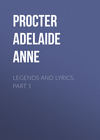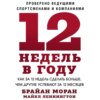Читать книгу: «Legends and Lyrics. Part 1»
DEDICATION
TO MATILDA M. HAYS.
“Our tokens of love are for the most part barbarous. Cold and lifeless, because they do not represent our life. The only gift is a portion of thyself. Therefore let the farmer give his corn; the miner, a gem; the sailor, coral and shells; the painter, his picture; and the poet, his poem.” – Emerson’s Essays.
A. A. P.
May, 1858
AN INTRODUCTION BY CHARLES DICKENS
In the spring of the year 1853, I observed, as conductor of the weekly journal Household Words, a short poem among the proffered contributions, very different, as I thought, from the shoal of verses perpetually setting through the office of such a periodical, and possessing much more merit. Its authoress was quite unknown to me. She was one Miss Mary Berwick, whom I had never heard of; and she was to be addressed by letter, if addressed at all, at a circulating library in the western district of London. Through this channel, Miss Berwick was informed that her poem was accepted, and was invited to send another. She complied, and became a regular and frequent contributor. Many letters passed between the journal and Miss Berwick, but Miss Berwick herself was never seen.
How we came gradually to establish, at the office of Household Words, that we knew all about Miss Berwick, I have never discovered. But we settled somehow, to our complete satisfaction, that she was governess in a family; that she went to Italy in that capacity, and returned; and that she had long been in the same family. We really knew nothing whatever of her, except that she was remarkably business-like, punctual, self-reliant, and reliable: so I suppose we insensibly invented the rest. For myself, my mother was not a more real personage to me, than Miss Berwick the governess became.
This went on until December, 1854, when the Christmas number, entitled The Seven Poor Travellers, was sent to press. Happening to be going to dine that day with an old and dear friend, distinguished in literature as Barry Cornwall, I took with me an early proof of that number, and remarked, as I laid it on the drawing-room table, that it contained a very pretty poem, written by a certain Miss Berwick. Next day brought me the disclosure that I had so spoken of the poem to the mother of its writer, in its writer’s presence; that I had no such correspondent in existence as Miss Berwick; and that the name had been assumed by Barry Cornwall’s eldest daughter, Miss Adelaide Anne Procter.
The anecdote I have here noted down, besides serving to explain why the parents of the late Miss Procter have looked to me for these poor words of remembrance of their lamented child, strikingly illustrates the honesty, independence, and quiet dignity, of the lady’s character. I had known her when she was very young; I had been honoured with her father’s friendship when I was myself a young aspirant; and she had said at home, “If I send him, in my own name, verses that he does not honestly like, either it will be very painful to him to return them, or he will print them for papa’s sake, and not for their own. So I have made up my mind to take my chance fairly with the unknown volunteers.”
Perhaps it requires an editor’s experience of the profoundly unreasonable grounds on which he is often urged to accept unsuitable articles – such as having been to school with the writer’s husband’s brother-in-law, or having lent an alpenstock in Switzerland to the writer’s wife’s nephew, when that interesting stranger had broken his own – fully to appreciate the delicacy and the self-respect of this resolution.
Some verses by Miss Procter had been published in the Book of Beauty, ten years before she became Miss Berwick. With the exception of two poems in the Cornhill Magazine, two in Good Words, and others in a little book called A Chaplet of Verses (issued in 1862 for the benefit of a Night Refuge), her published writings first appeared in Household Words, or All the Year Round. The present edition contains the whole of her Legends and Lyrics, and originates in the great favour with which they have been received by the public.
Miss Procter was born in Bedford Square, London, on the 30th of October, 1825. Her love of poetry was conspicuous at so early an age, that I have before me a tiny album made of small note-paper, into which her favourite passages were copied for her by her mother’s hand before she herself could write. It looks as if she had carried it about, as another little girl might have carried a doll. She soon displayed a remarkable memory, and great quickness of apprehension. When she was quite a young child, she learned with facility several of the problems of Euclid. As she grew older, she acquired the French, Italian, and German languages; became a clever pianoforte player; and showed a true taste and sentiment in drawing. But, as soon as she had completely vanquished the difficulties of any one branch of study, it was her way to lose interest in it, and pass to another. While her mental resources were being trained, it was not at all suspected in her family that she had any gift of authorship, or any ambition to become a writer. Her father had no idea of her having ever attempted to turn a rhyme, until her first little poem saw the light in print.
When she attained to womanhood, she had read an extraordinary number of books, and throughout her life she was always largely adding to the number. In 1853 she went to Turin and its neighbourhood, on a visit to her aunt, a Roman Catholic lady. As Miss Procter had herself professed the Roman Catholic Faith two years before, she entered with the greater ardour on the study of the Piedmontese dialect, and the observation of the habits and manners of the peasantry. In the former, she soon became a proficient. On the latter head, I extract from her familiar letters written home to England at the time, two pleasant pieces of description.
A BETROTHAL
“We have been to a ball, of which I must give you a description. Last Tuesday we had just done dinner at about seven, and stepped out into the balcony to look at the remains of the sunset behind the mountains, when we heard very distinctly a band of music, which rather excited my astonishment, as a solitary organ is the utmost that toils up here. I went out of the room for a few minutes, and, on my returning, Emily said, ‘Oh! That band is playing at the farmer’s near here. The daughter is fiancée to-day, and they have a ball.’ I said, ‘I wish I was going!’ ‘Well,’ replied she, ‘the farmer’s wife did call to invite us.’ ‘Then I shall certainly go,’ I exclaimed. I applied to Madame B., who said she would like it very much, and we had better go, children and all. Some of the servants were already gone. We rushed away to put on some shawls, and put off any shred of black we might have about us (as the people would have been quite annoyed if we had appeared on such an occasion with any black), and we started. When we reached the farmer’s, which is a stone’s throw above our house, we were received with great enthusiasm; the only drawback being, that no one spoke French, and we did not yet speak Piedmontese. We were placed on a bench against the wall, and the people went on dancing. The room was a large whitewashed kitchen (I suppose), with several large pictures in black frames, and very smoky. I distinguished the Martyrdom of Saint Sebastian, and the others appeared equally lively and appropriate subjects. Whether they were Old Masters or not, and if so, by whom, I could not ascertain. The band were seated opposite us. Five men, with wind instruments, part of the band of the National Guard, to which the farmer’s sons belong. They played really admirably, and I began to be afraid that some idea of our dignity would prevent me getting a partner; so, by Madame B.’s advice, I went up to the bride, and offered to dance with her. Such a handsome young woman! Like one of Uwins’s pictures. Very dark, with a quantity of black hair, and on an immense scale. The children were already dancing, as well as the maids. After we came to an end of our dance, which was what they called a Polka-Mazourka, I saw the bride trying to screw up the courage of her fiancé to ask me to dance, which after a little hesitation he did. And admirably he danced, as indeed they all did – in excellent time, and with a little more spirit than one sees in a ball-room. In fact, they were very like one’s ordinary partners, except that they wore earrings and were in their shirt-sleeves, and truth compels me to state that they decidedly smelt of garlic. Some of them had been smoking, but threw away their cigars when we came in. The only thing that did not look cheerful was, that the room was only lighted by two or three oil-lamps, and that there seemed to be no preparation for refreshments. Madame B., seeing this, whispered to her maid, who disengaged herself from her partner, and ran off to the house; she and the kitchenmaid presently returning with a large tray covered with all kinds of cakes (of which we are great consumers and always have a stock), and a large hamper full of bottles of wine, with coffee and sugar. This seemed all very acceptable. The fiancée was requested to distribute the eatables, and a bucket of water being produced to wash the glasses in, the wine disappeared very quickly – as fast as they could open the bottles. But, elated, I suppose, by this, the floor was sprinkled with water, and the musicians played a Monferrino, which is a Piedmontese dance. Madame B. danced with the farmer’s son, and Emily with another distinguished member of the company. It was very fatiguing – something like a Scotch reel. My partner was a little man, like Perrot, and very proud of his dancing. He cut in the air and twisted about, until I was out of breath, though my attempts to imitate him were feeble in the extreme. At last, after seven or eight dances, I was obliged to sit down. We stayed till nine, and I was so dead beat with the heat that I could hardly crawl about the house, and in an agony with the cramp, it is so long since I have danced.”
A MARRIAGE
The wedding of the farmer’s daughter has taken place. We had hoped it would have been in the little chapel of our house, but it seems some special permission was necessary, and they applied for it too late. They all said, “This is the Constitution. There would have been no difficulty before!” the lower classes making the poor Constitution the scapegoat for everything they don’t like. So as it was impossible for us to climb up to the church where the wedding was to be, we contented ourselves with seeing the procession pass. It was not a very large one, for, it requiring some activity to go up, all the old people remained at home. It is not etiquette for the bride’s mother to go, and no unmarried woman can go to a wedding – I suppose for fear of its making her discontented with her own position. The procession stopped at our door, for the bride to receive our congratulations. She was dressed in a shot silk, with a yellow handkerchief, and rows of a large gold chain. In the afternoon they sent to request us to go there. On our arrival we found them dancing out of doors, and a most melancholy affair it was. All the bride’s sisters were not to be recognised, they had cried so. The mother sat in the house, and could not appear. And the bride was sobbing so, she could hardly stand! The most melancholy spectacle of all to my mind was, that the bridegroom was decidedly tipsy. He seemed rather affronted at all the distress. We danced a Monferrino; I with the bridegroom; and the bride crying the whole time. The company did their utmost to enliven her by firing pistols, but without success, and at last they began a series of yells, which reminded me of a set of savages. But even this delicate method of consolation failed, and the wishing good-bye began. It was altogether so melancholy an affair that Madame B. dropped a few tears, and I was very near it, particularly when the poor mother came out to see the last of her daughter, who was finally dragged off between her brother and uncle, with a last explosion of pistols. As she lives quite near, makes an excellent match, and is one of nine children, it really was a most desirable marriage, in spite of all the show of distress. Albert was so discomfited by it, that he forgot to kiss the bride as he had intended to do, and therefore went to call upon her yesterday, and found her very smiling in her new house, and supplied the omission. The cook came home from the wedding, declaring she was cured of any wish to marry – but I would not recommend any man to act upon that threat and make her an offer. In a couple of days we had some rolls of the bride’s first baking, which they call Madonnas. The musicians, it seems, were in the same state as the bridegroom, for, in escorting her home, they all fell down in the mud. My wrath against the bridegroom is somewhat calmed by finding that it is considered bad luck if he does not get tipsy at his wedding.”
* * * * *
Those readers of Miss Procter’s poems who should suppose from their tone that her mind was of a gloomy or despondent cast, would be curiously mistaken. She was exceedingly humorous, and had a great delight in humour. Cheerfulness was habitual with her, she was very ready at a sally or a reply, and in her laugh (as I remember well) there was an unusual vivacity, enjoyment, and sense of drollery. She was perfectly unconstrained and unaffected: as modestly silent about her productions, as she was generous with their pecuniary results. She was a friend who inspired the strongest attachments; she was a finely sympathetic woman, with a great accordant heart and a sterling noble nature. No claim can be set up for her, thank God, to the possession of any of the conventional poetical qualities. She never by any means held the opinion that she was among the greatest of human beings; she never suspected the existence of a conspiracy on the part of mankind against her; she never recognised in her best friends, her worst enemies; she never cultivated the luxury of being misunderstood and unappreciated; she would far rather have died without seeing a line of her composition in print, than that I should have maundered about her, here, as “the Poet”, or “the Poetess”.
With the recollection of Miss Procter as a mere child and as a woman, fresh upon me, it is natural that I should linger on my way to the close of this brief record, avoiding its end. But, even as the close came upon her, so must it come here.
Always impelled by an intense conviction that her life must not be dreamed away, and that her indulgence in her favourite pursuits must be balanced by action in the real world around her, she was indefatigable in her endeavours to do some good. Naturally enthusiastic, and conscientiously impressed with a deep sense of her Christian duty to her neighbour, she devoted herself to a variety of benevolent objects. Now, it was the visitation of the sick, that had possession of her; now, it was the sheltering of the houseless; now, it was the elementary teaching of the densely ignorant; now, it was the raising up of those who had wandered and got trodden under foot; now, it was the wider employment of her own sex in the general business of life; now, it was all these things at once. Perfectly unselfish, swift to sympathise and eager to relieve, she wrought at such designs with a flushed earnestness that disregarded season, weather, time of day or night, food, rest. Under such a hurry of the spirits, and such incessant occupation, the strongest constitution will commonly go down. Hers, neither of the strongest nor the weakest, yielded to the burden, and began to sink.
To have saved her life, then, by taking action on the warning that shone in her eyes and sounded in her voice, would have been impossible, without changing her nature. As long as the power of moving about in the old way was left to her, she must exercise it, or be killed by the restraint. And so the time came when she could move about no longer, and took to her bed.
All the restlessness gone then, and all the sweet patience of her natural disposition purified by the resignation of her soul, she lay upon her bed through the whole round of changes of the seasons. She lay upon her bed through fifteen months. In all that time, her old cheerfulness never quitted her. In all that time, not an impatient or a querulous minute can be remembered.
At length, at midnight on the second of February, 1864, she turned down a leaf of a little book she was reading, and shut it up.
The ministering hand that had copied the verses into the tiny album was soon around her neck, and she quietly asked, as the clock was on the stroke of one:
“Do you think I am dying, mamma?”
“I think you are very, very ill to-night, my dear!”
“Send for my sister. My feet are so cold. Lift me up?”
Her sister entering as they raised her, she said: “It has come at last!” And with a bright and happy smile, looked upward, and departed.
Well had she written:
Why shouldst thou fear the beautiful angel, Death,
Who waits thee at the portals of the skies,
Ready to kiss away thy struggling breath,
Ready with gentle hand to close thine eyes?
Oh what were life, if life were all? Thine eyes
Are blinded by their tears, or thou wouldst see
Thy treasures wait thee in the far-off skies,
And Death, thy friend, will give them all to thee.
VERSE: THE ANGEL’S STORY
Through the blue and frosty heavens
Christmas stars were shining bright;
Glistening lamps throughout the City
Almost matched their gleaming light;
While the winter snow was lying,
And the winter winds were sighing,
Long ago, one Christmas night.
While, from every tower and steeple,
Pealing bells were sounding clear,
(Never with such tones of gladness,
Save when Christmas time is near,)
Many a one that night was merry
Who had toiled through all the year.
That night saw old wrongs forgiven,
Friends, long parted, reconciled;
Voices all unused to laughter,
Mournful eyes that rarely smiled,
Trembling hearts that feared the morrow,
From their anxious thoughts beguiled.
Rich and poor felt love and blessing
From the gracious season fall;
Joy and plenty in the cottage,
Peace and feasting in the hall;
And the voices of the children
Ringing clear above it all!
Yet one house was dim and darkened;
Gloom, and sickness, and despair,
Dwelling in the gilded chambers.
Creeping up the marble stair,
Even stilled the voice of mourning —
For a child lay dying there.
Silken curtains fell around him,
Velvet carpets hushed the tread.
Many costly toys were lying,
All unheeded, by his bed;
And his tangled golden ringlets
Were on downy pillows spread.
The skill of all that mighty City
To save one little life was vain;
One little thread from being broken,
One fatal word from being spoken;
Nay, his very mother’s pain,
And the mighty love within her,
Could not give him health again.
So she knelt there still beside him,
She alone with strength to smile,
Promising that he should suffer
No more in a little while,
Murmuring tender song and story
Weary hours to beguile.
Suddenly an unseen Presence
Checked those constant moaning cries,
Stilled the little heart’s quick fluttering,
Raised those blue and wondering eyes,
Fixed on some mysterious vision,
With a startled sweet surprise.
For a radiant angel hovered,
Smiling, o’er the little bed;
White his raiment, from his shoulders
Snowy dove-like pinions spread,
And a starlike light was shining
In a Glory round his head.
While, with tender love, the angel,
Leaning o’er the little nest,
In his arms the sick child folding,
Laid him gently on his breast,
Sobs and wailings told the mother
That her darling was at rest.
So the angel, slowing rising,
Spread his wings; and, through the air,
Bore the child, and while he held him
To his heart with loving care,
Placed a branch of crimson roses
Tenderly beside him there.
While the child, thus clinging, floated
Towards the mansions of the Blest,
Gazing from his shining guardian
To the flowers upon his breast,
Thus the angel spake, still smiling
On the little heavenly guest:
“Know, dear little one, that Heaven
Does no earthly thing disdain,
Man’s poor joys find there an echo
Just as surely as his pain;
Love, on earth so feebly striving,
Lives divine in Heaven again!
“Once in that great town below us,
In a poor and narrow street,
Dwelt a little sickly orphan;
Gentle aid, or pity sweet,
Never in life’s rugged pathway
Guided his poor tottering feet.
“All the striving anxious forethought
That should only come with age,
Weighed upon his baby spirit,
Showed him soon life’s sternest page;
Grim Want was his nurse, and Sorrow
Was his only heritage.
“All too weak for childish pastimes,
Drearily the hours sped;
On his hands so small and trembling
Leaning his poor aching head,
Or, through dark and painful hours,
Lying sleepless on his bed.
“Dreaming strange and longing fancies
Of cool forests far away;
And of rosy, happy children,
Laughing merrily at play,
Coming home through green lanes, bearing
Trailing boughs of blooming May.
“Scarce a glimpse of azure heaven
Gleamed above that narrow street,
And the sultry air of Summer
(That you call so warm and sweet)
Fevered the poor Orphan, dwelling
In the crowded alley’s heat.
“One bright day, with feeble footsteps
Slowly forth he tried to crawl,
Through the crowded city’s pathways,
Till he reached a garden-wall;
Where ’mid princely halls and mansions
Stood the lordliest of all.
“There were trees with giant branches,
Velvet glades where shadows hide;
There were sparkling fountains glancing,
Flowers, which in luxuriant pride
Even wafted breaths of perfume
To the child who stood outside.
“He against the gate of iron
Pressed his wan and wistful face,
Gazing with an awe-struck pleasure
At the glories of the place;
Never had his brightest day-dream
Shone with half such wondrous grace.
“You were playing in that garden,
Throwing blossoms in the air,
Laughing when the petals floated
Downwards on your golden hair;
And the fond eyes watching o’er you,
And the splendour spread before you,
Told a House’s Hope was there.
“When your servants, tired of seeing
Such a face of want and woe,
Turning to the ragged Orphan,
Gave him coin, and bade him go,
Down his cheeks so thin and wasted,
Bitter tears began to flow.
“But that look of childish sorrow
On your tender child-heart fell,
And you plucked the reddest roses
From the tree you loved so well,
Passed them through the stern cold grating,
Gently bidding him ‘Farewell!’
“Dazzled by the fragrant treasure
And the gentle voice he heard,
In the poor forlorn boy’s spirit,
Joy, the sleeping Seraph, stirred;
In his hand he took the flowers,
In his heart the loving word.
“So he crept to his poor garret;
Poor no more, but rich and bright,
For the holy dreams of childhood —
Love, and Rest, and Hope, and Light —
Floated round the Orphan’s pillow
Through the starry summer night.
“Day dawned, yet the visions lasted;
All too weak to rise he lay;
Did he dream that none spake harshly —
All were strangely kind that day?
Surely then his treasured roses
Must have charmed all ills away.
“And he smiled, though they were fading;
One by one their leaves were shed;
‘Such bright things could never perish,
They would bloom again,’ he said.
When the next day’s sun had risen
Child and flowers both were dead.
“Know, dear little one! our Father
Will no gentle deed disdain;
Love on the cold earth beginning
Lives divine in Heaven again,
While the angel hearts that beat there
Still all tender thoughts retain.”
So the angel ceased, and gently
O’er his little burthen leant;
While the child gazed from the shining,
Loving eyes that o’er him bent,
To the blooming roses by him,
Wondering what that mystery meant.
Thus the radiant angel answered,
And with tender meaning smiled:
“Ere your childlike, loving spirit,
Sin and the hard world defiled,
God has given me leave to seek you —
I was once that little child!”
* * *
In the churchyard of that city
Rose a tomb of marble rare,
Decked, as soon as Spring awakened,
With her buds and blossoms fair —
And a humble grave beside it —
No one knew who rested there.












